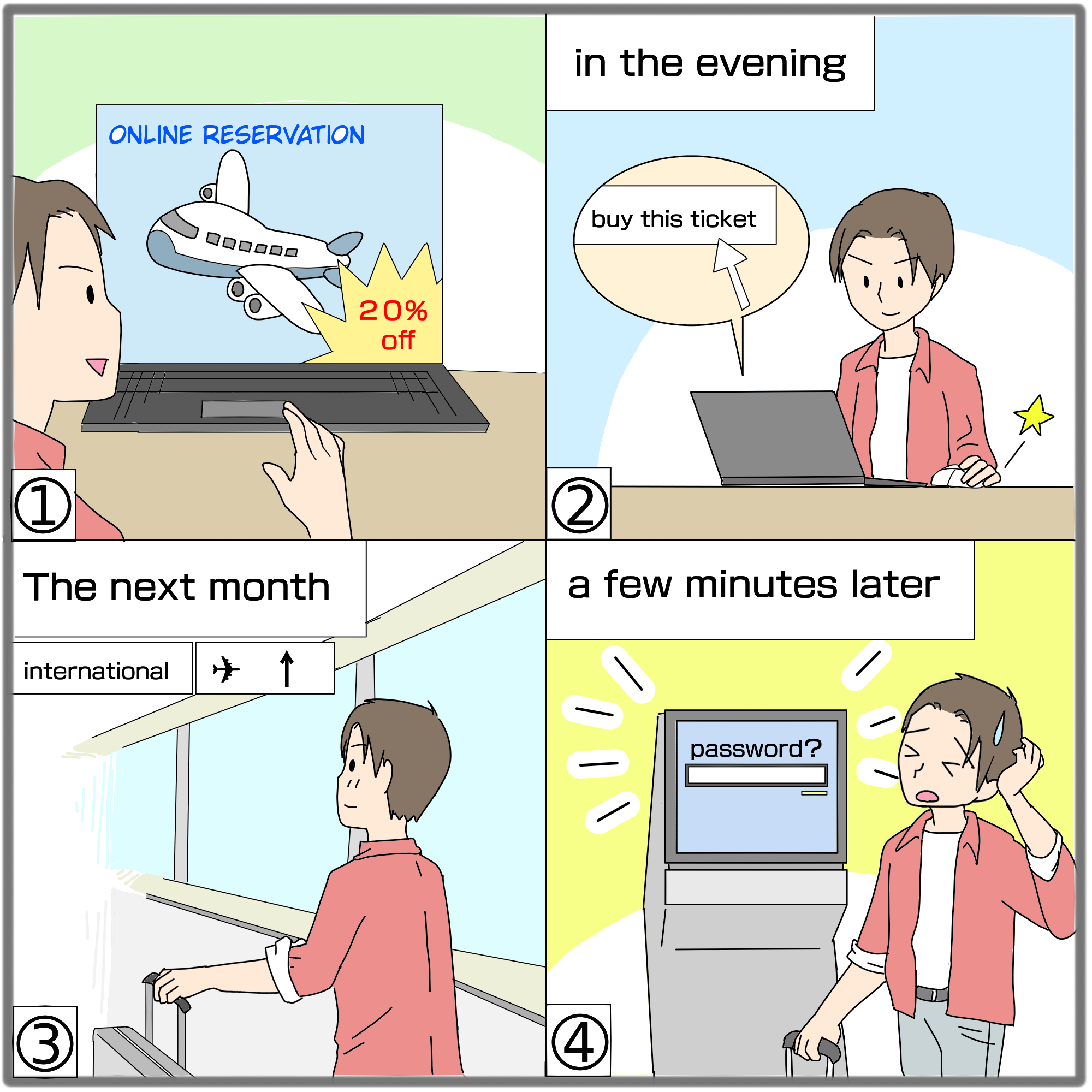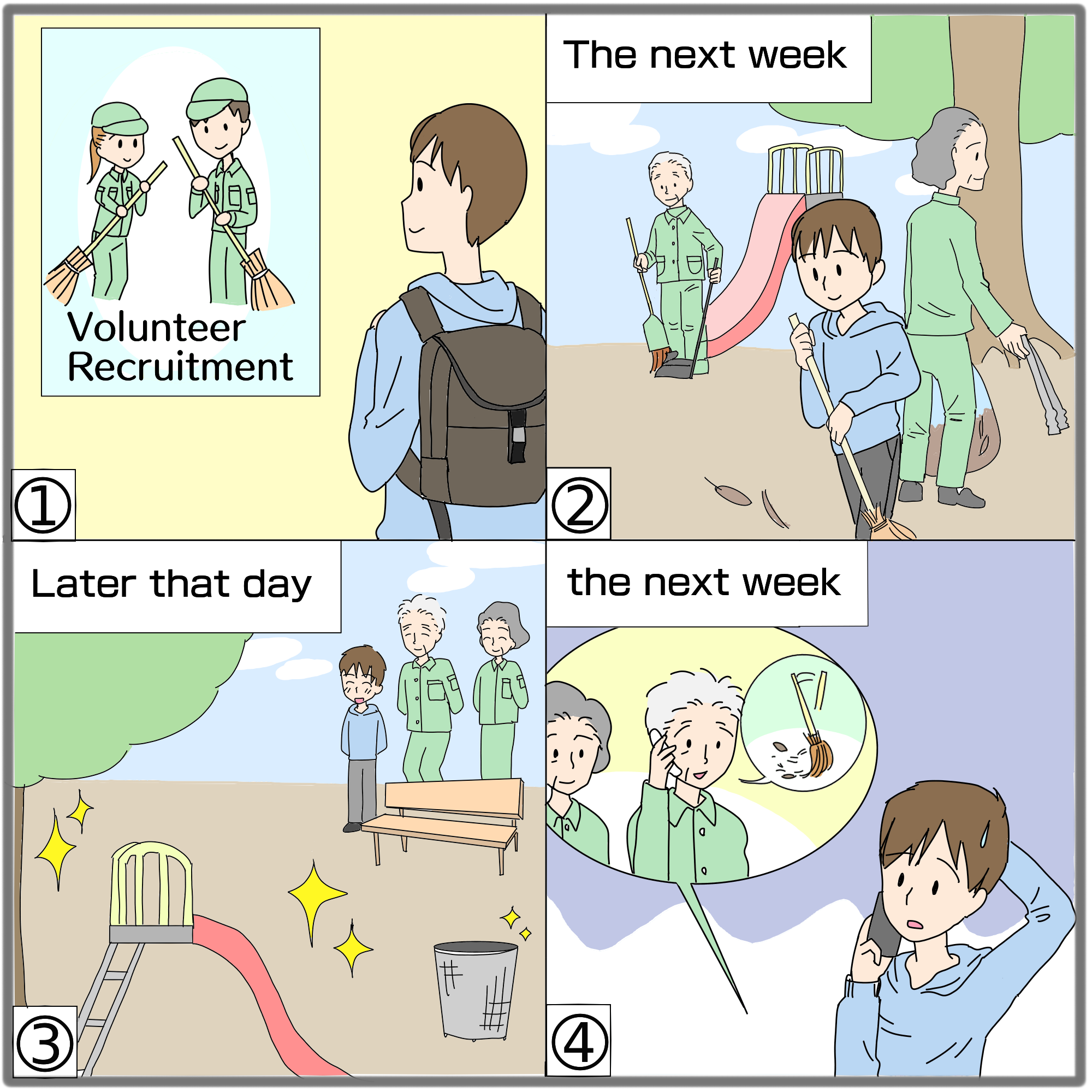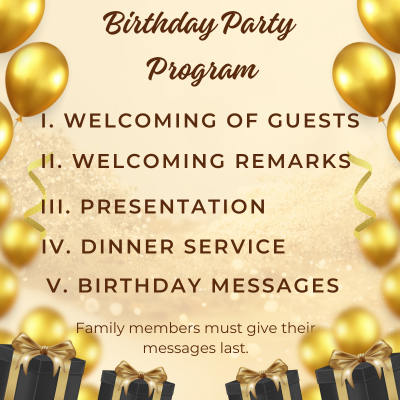PART A_1
Please look at the pictures below. Then, please answer the questions based on the pictures.
下記のイラストを見てください。イラストの内容をもとに質問に答えましょう。
PART A_2
This is a story about a man who watched an online advertisement.

| 1. | In the first picture, what did the man watch? |
| Answer: | |
| 2. | In the second picture, what did the man do? |
| Answer: | |
| 3. | In the third picture, where did the man go? |
| Answer: | |
| 4. | In the fourth picture, what happened to the man? |
| Answer: | |
PART A_3
Now, let’s review your answers.
ではあなたの答えを復習してみましょう。
(Please review your student’s answers by sending the correct answers in complete sentences. You may also give tips.)
PART A_4
PART A_5
Now, you will connect each sentence to tell a story. Your story should start with “One day, a man was watching an advertisement for an online pre-order sale.” You have two minutes to narrate the story.
それぞれの文章を繫げて、ストーリーを話しましょう。回答は、
One day, a man was watching an advertisement for an online pre-order sale.から始めてください。ストーリーを話す時間は2分間です。
One day, a man was watching an advertisement for an online pre-order sale.から始めてください。ストーリーを話す時間は2分間です。
(Please review your student’s answers by sending the correct answers in complete sentences. You may also give tips.)
PART A_6

| One day, a man was watching an advertisement for an online pre-order sale. | ||
| . | ||
| In the evening, | . | |
| . | ||
| Next month, | . | |
| . | ||
| A few minutes later, | . | |
| . |
PART A_7
Now, let’s review your answers.
ではあなたの答えを復習してみましょう。
(Please review your student’s answers by sending the correct answers in complete sentences. You may also give tips.)
PART A_8
PART A_9
I will ask a question about the picture below. Please answer based on your opinion.
Please answer in more than three sentences.
Please answer in more than three sentences.
講師がイラストについて質問します。あなたの考えをもとに答えましょう。
3文以上で答えて下さい。
3文以上で答えて下さい。
(Please send the mispronounced words and expressions to your student.)
PART A_10

| Question: | Please look at the fourth picture. If you were the man, what would you do? |
| Answer: |
PART B_1
Express your opinions on the following topics. You will be asked to give two answers. Your first answer should start with “I think so.” Your second answer should start with “I don’t think so.”
Now, please give your first answer, starting with “I think so.” Give at least one reason to support your opinion. Please answer in more than two sentences.
Now, please give your first answer, starting with “I think so.” Give at least one reason to support your opinion. Please answer in more than two sentences.
賛成、反対両方の意見を表現してみましょう。まずは1つ以上の理由をつけて、賛成意見を述べましょう。
回答は「I think so.」で始め、二文以上で答えて下さい。
回答は「I think so.」で始め、二文以上で答えて下さい。
PART B_2
| Do you think social media is just a trend? | |
| I think so. |
PART B_3
Now, let’s review your answer.
では、あなたの答えを復習してみましょう。その後、修正したあなたの答えを読んでみましょう。
(Please review your student’s answers by sending the correct answers in complete sentences. After that, ask your student to read aloud his or her corrected answers.)
PART B_4
PART B_5
Now, try to express your opinion in the opposite situation. Give at least one reason to support your opinion. You should start with “I don’t think so.” and answer in more than two sentences.
次に反対の立場になって意見を表現しましょう。回答は「I don’t think so.」で始め、1つ以上の理由を述べてください。意見は二つの文で述べましょう。
PART B_6
| Do you think social media is just a trend? | |
| I don’t think so. |
PART B_7
Now, let’s review your answer.
では、あなたの答えを復習してみましょう。その後、修正したあなたの答えを読んでみましょう。
(Please review your student’s answers by sending the correct answers in complete sentences. After that, ask your student to read aloud his or her corrected answers.)
PART B_8
PART C_1
You will answer the questions based on the data below. I will check if your sentences are complete and if the grammar is correct.
以下の情報をもとに、質問にこたえましょう。
PART C_2
Your internet suddenly stopped working. Look at the details and answer the following questions.
インターネットが突然使えなくなりました。詳細を見て、以下の質問に答えましょう。

| 1. | What seems to be the problem with your internet? |
| Answer: | |
| 2. | What could be the solution? |
| Answer: |
PART C_3
Now, let’s review your answers.
(Please review your student’s answers by sending the correct answers. You may also give tips.)
PART C_4
REVIEW AND FEEDBACK
Now, let us review the things that you learned in this lesson.
ではこのレッスンで学んだことを振り返りましょう。
(Please give short feedback on how your student did in your class.)
| Grammar 文法 |
Pronunciation 発音 | Vocabulary 単語 |
Comprehension 理解 |
|
|---|---|---|---|---|
 GOOD GOOD |
文法の誤りはほとんどなく、完全な文章で話すことができる | ほとんどの単語をはっきりと正しく発音することができる | 習った表現を適切に使うことができる | 文章を理解し、質問に正しく答えることができる |
 FAIR |
文法の誤りはあるが、完全な文章で話すことができる | 発音の練習が必要な言葉がいくつかある | たまにミスはあるが、習った表現を適切に使うことができる | 文章を完全に理解するのは難しく、質問に正しく答えられないときもある |
 POOR |
文章で話すのは難しく、単語だけで話すことができる | 発音の練習が必要である | 習った単語と表現を少しだけ使うことができる | 文章を理解するのは難しく、質問に答えるのは難しい |













